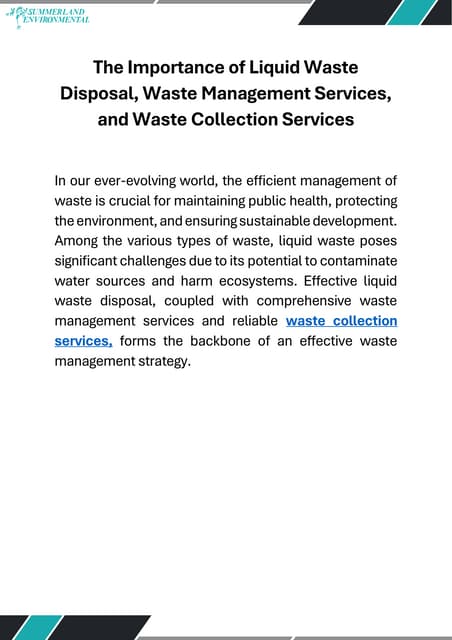Things about Reclaim Waste
Table of ContentsIndicators on Reclaim Waste You Should KnowOur Reclaim Waste IdeasThe Greatest Guide To Reclaim WasteReclaim Waste Fundamentals ExplainedThe smart Trick of Reclaim Waste That Nobody is Talking About
Domestic sewer waste refers to the waste and items from a domestic septic container. The correct management and disposal of residential sewage waste need fluid waste to be transferred to a sewage therapy plant where the appropriate approaches and tools are used to detoxify and dispose of waste.
Business waste usually consists of possible threats, such as flammable materials or a mix of liquid and strong waste products, and requires an advanced and detailed disposal procedure. The disposal of industrial waste commonly involves the filtration of waste before transport to make certain secure and proper disposal. Hazardous waste is created from results and runoff of industrial procedures and manufacturing.
This type of waste can not use the exact same sewer management transportation or procedures as septic or commercial liquids. The commercial waste management procedure needs the examination and screening of liquid waste prior to it goes through the disposal procedure (liquid waste removal). Runoff waste is the liquid waste that comes from overflow and excess stormwater in very populated areas or cities
Runoff waste can cause contamination and flooding otherwise taken care of correctly. Find out much more concerning drain cleansing and waste monitoring. Guaranteeing appropriate waste management can stop disasters and reduce environmental harm. Both people in property settings and specialists in industrial or manufacturing sectors can gain from understanding the processes and laws of fluid waste management.
Not known Incorrect Statements About Reclaim Waste
Get in touch with PROS Providers today to learn more about our waste monitoring and disposal services and the appropriate means to take care of the liquid waste you create.
Do you recognize what occurs to your water when you disengage, flush the toilet or drain the washing machine? No? Well, it's worth knowing. This so-called 'wastewater' is not only an important source yet, after therapy, will certainly be released to our land, waterways or the ocean. Utilized water from commodes, showers, bathrooms, kitchen sinks, laundries and industrial procedures is referred to as wastewater.

water made use of to cool down equipment or tidy plant and equipment). Stormwater, a type of wastewater, is overflow that streams from farming and metropolitan areas such as roof coverings, parks, gardens, roads, paths and gutters right into stormwater drains, after rain. Stormwater streams unattended straight to neighborhood creeks or rivers, at some point reaching the ocean.
The Reclaim Waste Statements
In Queensland, most wastewater is dealt with at sewage therapy plants. Wastewater is moved from residential or commercial sites through a system of sewers and pump terminals, called sewage reticulation, to a sewer treatment plant. City governments build, keep and operate most sewage treatment plants. Operators are certified under the Environmental Security Act 1994 to release treated wastewater at an acceptable ecological requirement into waterways.
The Department of Natural Resources suggests city governments about managing, operating and maintaining sewage systems and treatment plants. In unsewered locations, city governments may call for householders to install private or household sewer treatment systems to deal with domestic wastewater from bathrooms, cooking areas, washrooms and washings. The Department of Natural Resources authorizes making use of family systems when they are proven to be efficient.
In some brand-new communities, treatment of some stormwater to remove trash, sand and crushed rock has started using gross contaminant catches. Wastewater treatment happens in 4 phases: Removes strong matter.
Wastewater then streams into huge tanks where solids work out and are eliminated as sludge. Oil and scum are skimmed from the surface area. Utilizes small living microorganisms understands as micro-organisms to break down and eliminate remaining dissolved wastes and fine bits. Micro-organisms and wastes are incorporated in the sludge. Gets rid of nitrogen and phosphorus nutrients that might cause algal blossoms in our rivers and endanger water life.
10 Easy Facts About Reclaim Waste Explained
Nutrient elimination is not readily available whatsoever sewer therapy plants since it calls for costly specialist equipment. It address is coming to be extra typical in Queensland. Clear liquid effluent produced after therapy might still include disease-causing micro-organisms. If this effluent is launched into waterways such as rivers or the sea, the micro-organisms will at some point die out.

This typically suggests wastewater needs to be treated or pollutants gotten rid of prior to it can be released to waterways. A lot of wastewater moves into the sewage system. Under the Act, regional governments provide approvals and permits for eco relevant tasks (ERAs) entailing wastewater releases that may have a regional effect. The division carries out approvals and licences to Periods involving wastewater releases that might have a local or statewide influence.
9 Simple Techniques For Reclaim Waste
Monitoring supplies accurate information concerning water top quality and can validate that licence problems are being satisfied. The information gotten with monitoring offers the basis for making water quality choices.
Comments on “The Main Principles Of Reclaim Waste”